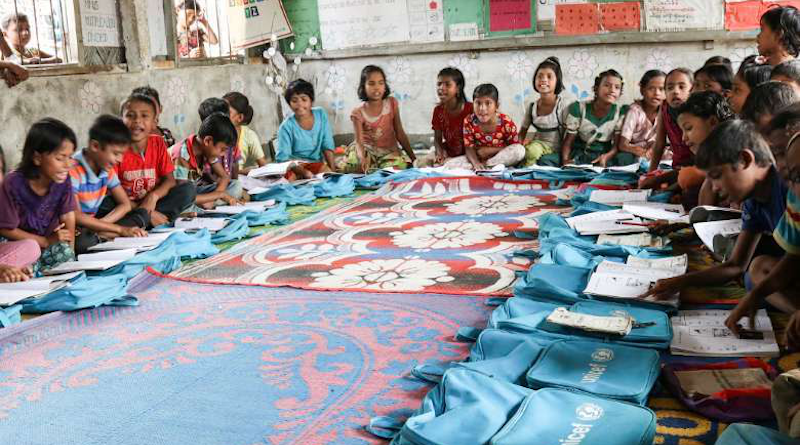Bangladesh Under Fire For Closing Rohingya Camp Schools
By UCA News
By Stephan Uttom
(UCA News) — A leading human rights agency has slammed the Bangladesh government’s decision to close schools in Rohingya camps, calling the move a cruel and massive violation of the right to education.
The decision was issued on Dec. 13 by the Refugee Relief and Repatriation Commissioner (RRRC) regarding refugee camps where about 400,000 school-age children are confined, according to a statement issued by Human Rights Watch (HRW) on Dec. 18.
Several educational institutions have already been shut down following calls by the Bangladesh government to close community-based and home-based schools — a move the New York-based rights organization has labeled a massive violation of the right to education.
“Bangladesh’s decision to close schools for Rohingya refugee children violates the right to education on a massive scale,” said Bill Van Esveld, associate children’s rights director at HRW. “This cruel decision should be immediately reversed so that Rohingya children can get an education, which will be especially critical for their return to Myanmar when it is safe to do so.”
Since August 2017, more than 745,000 Rohingya refugees have fled outbreaks of violence and military operations in neighboring Myanmar. There are more than 860,000 Rohingya refugees living in 34 camp settlements across Ukhiya and Teknaf subdistricts of Cox Bazar, with over 55 percent of them below the age of 18.
Following a massive scale-up at the start of the response, education sector partners currently provide services through more than 6,000 learning centers.
A 30-year-old Rohingya teacher, who runs a community school with 60 students in Cox’s Bazar refugee camp, said an RRRC official visited on Dec. 13 and forbade him to run the school.
“I used to teach primary education in the Myanmar language in my school but I don’t know why the Bangladesh government took such a decision. If our children are not educated, then their prospects will not improve,” the teacher told UCA News on condition of anonymity. He has been running his school for the last year without payment from any organization.
Rohingya leaders say the government has taken this decision because of the recent anarchy and conflicts in Rohingya camps. But they are campaigning to stop the closure of community-based schools.
A Catholic Church leader said the closure of community-based schools was not a solution to problems at camps but would further alienate the Rohingya.
“Home-based and community-based schools should not be closed. If the government thinks that some ideology is being pushed which is harmful to the country, then these schools can be placed under surveillance. Because many are teaching voluntarily, it is not bad,” Holy Cross Father Liton Hubert Gomes told UCA News.
“The Rohingya are entitled to the right to education and if they are deprived of this right, then it can be as harmful for them as it is for us,” added Father Gomes, secretary of the Catholic bishops’ Justice and Peace Commission.
RRRC additional commissioner Mohammad Shamsud Douza said they are not closing any schools but are ensuring there is a uniform education system in the refugee camps.
“Many educational institutions have grown up in the camps, such as madrasa schools. We are closing these. We want a universal education system,” Douza told UCA News.


Although the government of Bangladesh has made all arrangements for the Rohingyas to stay and eat in the country in the interest of humanity, are the Rohingyas paying their due compensation? The answer is no. They are slowly becoming a cause of loss for Bangladesh. The Rohingya problem in Myanmar is one of the major problems in present day Bangladesh. The international community must be pressured to bring them back quickly.